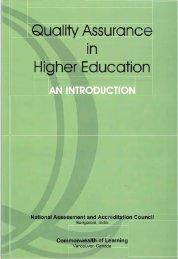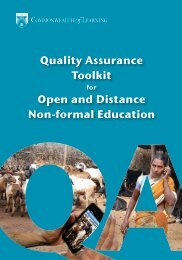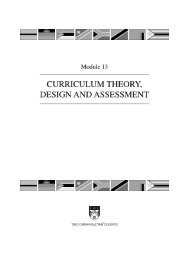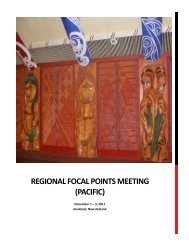Tech-MODE for Agricultural Education and Improved Livelihoods in ...
Tech-MODE for Agricultural Education and Improved Livelihoods in ...
Tech-MODE for Agricultural Education and Improved Livelihoods in ...
Create successful ePaper yourself
Turn your PDF publications into a flip-book with our unique Google optimized e-Paper software.
SYNTHESIS OF EIGHT COUNTRY CASE STUDIES<br />
because of its flexibility, reduced cost <strong>and</strong> <strong>in</strong>teractive approach <strong>for</strong> reach<strong>in</strong>g out to<br />
a larger population of learners.<br />
This country report highlights the major ways <strong>in</strong> which agricultural education is<br />
imparted at various levels <strong>in</strong> Ug<strong>and</strong>a. An attempt has also been made to explore the<br />
potential <strong>for</strong> the use of ICT <strong>in</strong> agricultural education <strong>and</strong> tra<strong>in</strong><strong>in</strong>g <strong>in</strong> Ug<strong>and</strong>a. The<br />
policy environment surround<strong>in</strong>g the use of ICT is discussed <strong>and</strong> the <strong>in</strong>frastructural,<br />
human <strong>and</strong> policy challenges fac<strong>in</strong>g <strong>Tech</strong>-<strong>MODE</strong> have been identified. F<strong>in</strong>ally, a<br />
few recommendations have been made <strong>for</strong> strengthen<strong>in</strong>g agricultural education to<br />
enhance its contribution to livelihoods us<strong>in</strong>g <strong>Tech</strong>-<strong>MODE</strong>. It is envisaged that the<br />
<strong>in</strong><strong>for</strong>mation here will <strong>in</strong><strong>for</strong>m the process of nurtur<strong>in</strong>g a partnership between the<br />
Commonwealth of Learn<strong>in</strong>g (COL), the Forum <strong>for</strong> Agriculture Research <strong>in</strong> Africa<br />
(FARA) <strong>and</strong> strategic <strong>in</strong>stitutions <strong>in</strong>volved <strong>in</strong> agricultural capacity build<strong>in</strong>g <strong>in</strong><br />
Ug<strong>and</strong>a.<br />
Zambia – Mungule Chikoye, Mart<strong>in</strong> Kaonga<br />
This country report assesses the potential <strong>for</strong> <strong>in</strong>troduction <strong>and</strong> adoption of<br />
technology-mediated open <strong>and</strong> distance education (<strong>Tech</strong>-<strong>MODE</strong>) <strong>in</strong> agricultural<br />
education <strong>and</strong> tra<strong>in</strong><strong>in</strong>g <strong>in</strong> Zambia. It is based on desktop studies <strong>and</strong> <strong>in</strong>terviews<br />
with stakeholders <strong>in</strong> agricultural education <strong>and</strong> tra<strong>in</strong><strong>in</strong>g. Despite adopt<strong>in</strong>g<br />
expansionist post-<strong>in</strong>dependence educational policies, Zambia has failed to achieve<br />
the critical mass of human resources required <strong>for</strong> susta<strong>in</strong>able agricultural development<br />
because of a variety of factors <strong>in</strong>clud<strong>in</strong>g <strong>in</strong>adequate agricultural policies <strong>and</strong><br />
reduced productivity of vital sectors (m<strong>in</strong><strong>in</strong>g, agriculture <strong>and</strong> manufactur<strong>in</strong>g).<br />
However, the current agricultural policy (2005-2015) recognizes that achievement<br />
of agricultural education <strong>and</strong> tra<strong>in</strong><strong>in</strong>g targets requires strengthen<strong>in</strong>g of both <strong>for</strong>mal<br />
<strong>and</strong> non-<strong>for</strong>mal education modes because the <strong>for</strong>mal education system alone<br />
cannot meet national tra<strong>in</strong><strong>in</strong>g needs. The Government has expressed a strong<br />
political will to support open <strong>and</strong> distance learn<strong>in</strong>g (ODL) through education<br />
policies that recognize ODL as a complementary mode of education, <strong>and</strong> an<br />
<strong>in</strong><strong>for</strong>mation <strong>and</strong> communications technology (ICT) policy that seeks to <strong>in</strong>tegrate<br />
ICT <strong>in</strong> agricultural education <strong>and</strong> tra<strong>in</strong><strong>in</strong>g.<br />
Zambian <strong>in</strong>stitutions have historically provided ODL <strong>in</strong> non-vocational discipl<strong>in</strong>es,<br />
but <strong>Tech</strong>-<strong>MODE</strong> <strong>in</strong> agriculture is a relatively new concept. The concept is complex<br />
because it has strong vocational components, requires specialised technological<br />
methodologies, depends on students’ abilities to motivate <strong>and</strong> manage themselves<br />
<strong>and</strong> requires a front-loaded <strong>in</strong>vestment. But the national ICT <strong>in</strong>frastructure is<br />
underdeveloped. <strong>Tech</strong>-<strong>MODE</strong> is also time-consum<strong>in</strong>g, expensive to set up <strong>and</strong><br />
requires efficient adm<strong>in</strong>istrative support. Furthermore, it is subject to market<br />
<strong>for</strong>ces, attracts a more diversified clientele, <strong>and</strong> requires credible qualifications,<br />
<strong>in</strong>stitutional accreditation <strong>and</strong> good practice to compete with class-based systems.<br />
These challenges will determ<strong>in</strong>e the per<strong>for</strong>mance of <strong>Tech</strong>-<strong>MODE</strong> <strong>in</strong> Zambia.<br />
22 ■ TECH-<strong>MODE</strong> FOR AGRICULTURAL EDUCATION AND IMPROVED LIVELIHOODS IN SUB-SAHARAN AFRICA: COUNTRY CASE STUDIES









